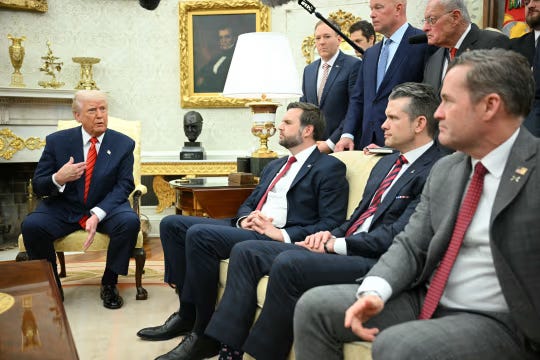'Signal Gate' is a political operation intended to sow discord within the Trump White House
Certain political factions seek to turn a minor incident into a wall-to-wall scandal.
A couple of weeks ago, a publicly unknown security breach occurred within the Trump administration involving plans for airstrikes against Yemen’s Houthis, the Iran-backed jihadist militia that has wreaked havoc in the Red Sea and caused a deliberate disruption in global trade.
A quick note from today’s sponsor, which I urge you to check out for yourself:
Don’t let a broken heater break the bank
Home repair costs have surged in recent years due to inflation and supply chain issues. Fortunately, a home warranty could help cover your home appliances and systems.
Check out Money’s list of the Best Home Warranties and start protecting your essential appliances.
On March 13, a group chat on the encrypted messaging app Signal, titled “Houthi PC small group” (likely meaning Principals Committee, a senior national security group), was created by someone identified as President Trump’s National Security Adviser Michael Waltz. This chat included high-ranking U.S. officials like Vice President JD Vance, Defense Secretary Pete Hegseth, Secretary of State Marco Rubio, and others—18 members in total.
Jeffrey Goldberg, the editor-in-chief of The Atlantic, was most likely accidentally added to this group and likely appeared in the chat under the initials “JG.” The most likely explanation is that he shares initials with Jamieson Greer, who was the national security official intended to be added.
Over the next few days, Goldberg (who is best known for laundering a series of hoaxes into the media against President Trump) observed, in unethical silence, these officials discussing and finalizing plans for U.S. airstrikes on Houthi targets, set for March 15. Sec Def Hegseth shared a timeline of operational plans. JD Vance expressed reservations, arguing the strikes might disproportionately benefit European trade over U.S. interests, though he agreed to support the group’s consensus. By March 15, hours before the strikes began, Goldberg had a front-row seat to the real-time coordination—complete with updates, fist-bump emojis, and praise from officials like Waltz and Chief of Staff Susie Wiles after the bombs hit their targets.
Now, Goldberg has the rolodex and contacts to verify the legitimacy of the chat within minutes of being added to it. In any other situation outside of politics, lurking in a confidential chat would be considered, at best, a massive violation of ethics and character. Instead of informing the group that they probably made a mistake, Goldberg eavesdropped on the conversation for multiple days while siphoning information that did not belong to him. Far from the “patriotic” label the media has attributed to him, his behavior here was beyond despicable and morally bankrupt.
The strikes themselves were a resounding success, targeting Houthi sites across Yemen, hitting top leadership, weapons facilities, and command centers, killing dozens of militants. The U.S. aimed, per President Trump’s directive, to deter Houthi attacks on Red Sea shipping lanes, which have disrupted global trade since late 2023.
On Monday, over a week after the strikes, Goldberg published his article in The Atlantic, which was amazingly timed just before a Senate committee hearing that featured some of the key leaders in the Signal chat.
The White House and National Security Council later confirmed the chat was authentic, calling it an “inadvertent” error—someone added the wrong number.
But two political factions, in particular, are trying to make “Signal Gate” out to be a full-blown crisis when Occam’s Razor tells us it was most likely some staffer simply adding the wrong person to a chat.
Democrats, including Senate Minority Leader Chuck Schumer, labeled it a “stunning breach,” possibly violating the Espionage Act, despite the Biden Administration being the entity that officially approved the app for communications use.
And a particular isolationist faction on the right has sought to weaponize the misstep into an attempt to force the resignations of Hegseth and Waltz, who they view as not sufficiently restraint-oriented.
Public reaction has been mixed. Some see it as incompetence—a sloppy mistake by a new administration—while others, especially those who do not follow the daily news cycle, don’t care much for all the outrage. The fallout has been limited, but the abovementioned actors seek to turn this overblown incident into a scandal.
All things considered, the Signal blunder did not negatively impact the operation whatsoever, and the Houthi strikes appeared to be very effective. A one-off incident of mistakenly adding someone to a Signal chat is not a national crisis, and the only reason that it remains in the news cycle is because political operators want it to be that way. If anything, it's good this incident happened early on. It can serve as a no-harm, no-foul reminder to beef up best practices for sensitive communications, reminding officials and their staffers to triple-check participants.
They added the wrong guy to the group chat. It happens. It’s time to move on to issues of real consequence for Americans.




Republicans need to get a clue card. Stop reacting to everything the media says. Stop reporting on it. Ignore it. Move on..
liberals damn sure wouldn’t care. They’d move on and never stop. Media is part of the problem.
After reading or watching news. I ask myself.. is this information, or is it information splashed with partisanship meant to divide?
To me it looked like every FOIAed government conversation I've ever read. Obviously whoever is responsible for actually adding JG should be reprimanded, but it's hilarious to hear the media yapping about how evading FOIA is a huge deal when they were silent about Fauci and the GoF crew doing it a few years ago.